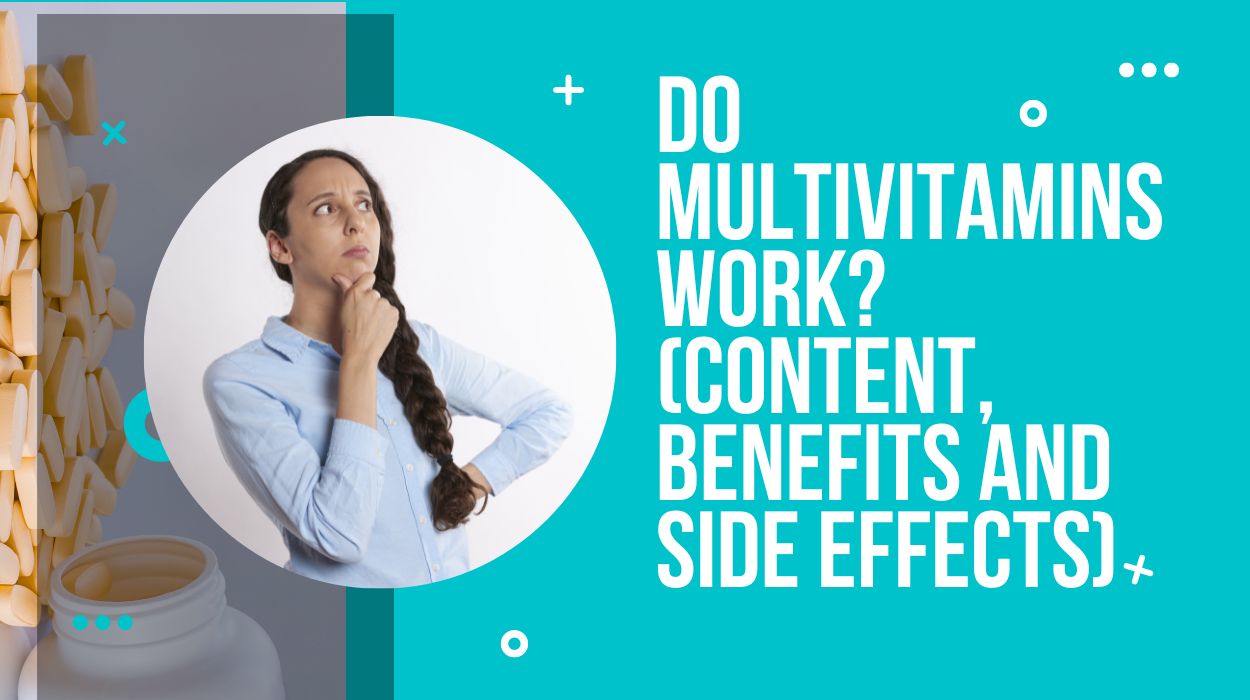A multivitamin is a dietary supplement containing many vitamins, minerals, and other nutritional values. You can get it in tablet, powder, liquid, capsule, and injectable forms.
Now, does it really benefit your body and provide enough nutrition? Yes, it does! But, how? And what amount of it is beneficial and for what body functions?
To learn more about ‘do multivitamins work?’ read on! This article will discuss all you are looking for in multivitamins, including their elements, benefits, work, time to consume, and side effects.
What do multivitamins contain?

Generally, multivitamin has Vitamin C, B1, B2, B3, B5, B6, B7, B9, B12, A, E, D2, K, potassium, selenium, iodine, zinc, calcium, borate, magnesium, iron, beta carotene, molybdenum, and manganese. All these nutrients work differently for different parts of the body. Therefore, a multivitamin is a multifunctional supplement that benefits almost all of your body parts.
Not all multivitamins have all the values mentioned above. So, buy according to your nutritional needs based on age and sex or doctor’s recommendation. But, for any purpose, buy a multivitamin necessarily consisting of Vitamin D, magnesium, calcium, zinc, iron, folate, and Vitamin B12, as they are essential nutrients your body requires to boost up.
Advice: Remember not to rely on multivitamins entirely. First, try to fulfil your body’s needs through food and natural nutritional liquids. And if necessary, take it.
How do multivitamins work?

If you are healthy and follow a balanced diet, you do not require multivitamins. But, if you have any nutrient deficiency, your doctor might recommend the best multivitamins as it has a low risk. Now, how will it work to provide your body with enough nutritional value?
Vitamins are small molecules our body requires to perform certain reactions. And minerals are important to keep your brain, bones, muscles, and heart function healthy. Some nutrients are also essential to make enzymes and hormones in the body. And if any of the functions work improperly, it may cause health issues.
Therefore, multivitamins here help every organ and body part work properly to keep you healthy. So, now to dive deeper into the working process of multivitamins, let us study about its benefits!
What are the benefits of multivitamins?

The various minerals and vitamins of multivitamins provide you with multiple benefits. Let us see each of them!
1. Prevent heart diseases
The Vitamin antioxidants in multivitamins, namely Vitamin C and E, may help you prevent heart diseases. Vitamin C reduces the blood level of bad cholesterol and triglycerides in the body by reducing the chances of heart diseases. Vitamin E may help treat coronary artery diseases and lower the chances of a heart attack in many heart patients.
2. Reduces risk of cancer
Vitamin C, D, and E may help reduce the risk of lung, neck, stomach, prostate, gastric, and colorectal cancers. Also, selenium and Vitamin A, C, and E help prevent cell damage. But, do not take a multivitamin as a supplement until your doctor asks you. Because if you are undergoing chemotherapy, multivitamins may stop it from showing positive results.
3. Help improve memory
The presence of Vitamin B-12 in multivitamins helps keep your nerve cells and red blood cells healthy, improving memory, especially at old age. It also helps improve cognitive performance in children and adults.
4. Reduces depression and stress
Vitamin B12 and folate are essential nutrients to maintain a healthy mental state. Therefore multivitamins containing these nutrients benefit in reducing mood disorders, stress, anxiety, and depression.
5. Maintain eye health
Some vitamins, riboflavin, niacin, omega-3 fatty acids, and many more nutrients present in multivitamin helps maintain eye health. Among all, Vitamin A plays a crucial role in maintaining a clear cornea, enabling you to see things in low light.
6. Increases immunity and metabolism
Vitamin B in multivitamins, mainly B6, B9, and B12, are necessary to balance the immune system. It helps you increase your low level of immunity power and metabolism.
7. Strengthen muscles
Calcium, potassium, magnesium, and several vitamins in a multivitamin are good to strengthen muscles. It may also help you recover after an intense workout and increase muscle mass. But, still, your body will require enough rest after a workout.
8. Maintain healthy hair
Vitamin B, D, and zinc contribute to keeping your hair follicles healthy, increasing hair growth. Multivitamins may also prevent dryness and provide you with shiny and thick hair, especially if the reason behind your hair loss is nutritional deficiency.
Who can include multivitamins in their diet and when to consume them?

As said before, multivitamins are necessary for people with nutritional deficiencies. Otherwise, only take multivitamins if your doctor recommends you because of any health issue.
Multivitamins are safe for every age group. In elders, it is recommended mainly because of a lack of Vitamin B-12 and D-3. Also, as the pregnant woman carries a baby, she requires more nutrients, so the doctor recommends taking multivitamins to them.
Vegans sometimes do not get enough nutrients from vegetables and fruits compared to non-vegetarians. They lack mainly Vitamin B, D, calcium, and omega-3 fatty acids, primarily found in dairy products and non-veg food items. So, they need to boost up nutritional value in their body, for which doctor recommends them to consume multivitamins.
The best time to consume it is in the morning, 1 hour before or 2 hours after the meal. But, if you feel uneasiness in your stomach, try taking it with the meal or as per the doctor’s suggestions.
What are the side effects of multivitamins?

Usually, for baby’s upto 11 years, the recommended amount of multivitamin intake is 5 ml per day. And for children over 11 years and adults, 10 ml a day or one multivitamin tablet per day is considered safe. But what if you take a high dose of a multivitamin? It may show side effects, and even for some, it could be life-threatening. So, let us briefly see multivitamins’ side effects!
1. Color changes in stool
The multivitamin food that is dark in color or the tablets or powdered form of a multivitamin rich in iron can cause black, dark brown, or greenish stools. Do not worry about it as it is not a dangerous side effect.
2. Constipation
8 mg of iron and 1,000 mg of calcium per day is the maximum requirement of your body. So, if your multivitamin intake has iron and calcium, take a note of it and consume accordingly as a high dose of it may cause constipation or diarrhea.
3. Nausea
Do not consume more than the recommended amount of multivitamins per day as it may cause nausea. Why? Because of the presence of either Vitamin C, zinc, or iron.
4. Vomiting
Too much intake of Vitamin D can cause vomiting. And also, in some, frequent intake of multivitamins empty stomach may cause vomiting because of continuous GI tract upsetness. Therefore, if you are not comfortable eating a multivitamin empty stomach, take it with the meal in the morning.
5. Abdominal pain
High doses of multivitamins are likely to upset your stomach. It, in turn, may cause abdominal pain and other gastro-related issues in some people. If you face aggressive pain, it may be the reason for irritable bowel syndrome, peptic ulcers, or other diseases. Hence, consult your doctor as soon as possible.
6. Nerve damage
If taken more than the recommended amount, a multivitamin having selenium may show side effects like mild nerve damage, fatigue, or hair loss. Even very high doses can result in severe health issues.
7. Unpleasant mouth taste
Many multivitamins have metals in them, like calcium, chromium, copper, iron, zinc, and much more, which can be the reason behind an unpleasant metallic taste in your mouth. But, do not worry! The foul taste goes away sooner.
8. Headache
Excess fat-soluble vitamins in multivitamins like Vitamin A, D, E, and K may cause headaches. They are more likely to build toxicity than water-soluble vitamins. So, take a light dose of it and stay free from its side effects.
Conclusion
Yes! Multivitamins do work in your body, giving a positive response. It fulfils the nutrient sufficiency in your body by providing many health benefits.
Multivitamins have various vitamins and minerals that help prevent heart diseases, reduce the risk of cancer, stress, depression, and help improve memory, eye health, muscle mass, and maintain healthy hair. But if taken more than the doctor’s recommended dose, it may show side effects like abdominal pain, headache, and much more.
We hope you found the article helpful. Please share your experience of reading the article in the comment section below.


